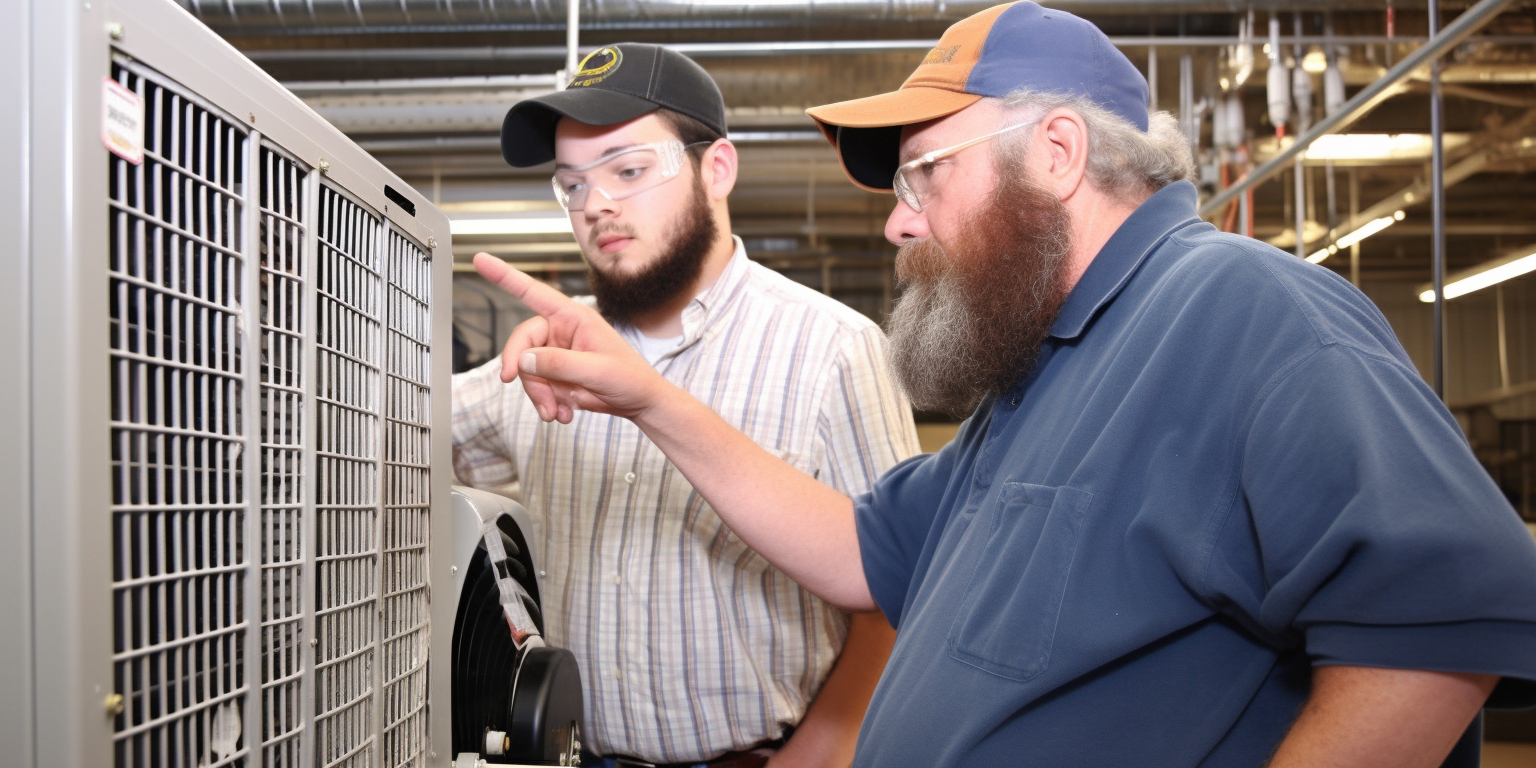Embarking on a career in the HVAC field requires dedication, hands-on experience, and a continuous willingness to learn. This piece delves into the nuances of gaining HVAC experience, outlining the central role of trade schools, the importance of industry trends and technological advancements, and the key skills necessary to succeed. From practical education to customer service finesse, each component contributes to molding a competent, competitive HVAC professional.
What are the basic qualifications needed to start a career in HVAC?
Starting a career in HVAC (Heating, Ventilation, and Air Conditioning) requires a certain set of qualifications. Firstly, a high school diploma or its equivalent is usually necessary. This provides a foundation in basic math and science, both of which are integral to understanding HVAC systems.
Secondly, technical knowledge is a requirement. This can be acquired through a technical school or community college HVAC program. These programs typically last from six months to two years and cover topics such as basic refrigeration, heating technology, and air conditioning.
In addition to formal education, practical experience is highly valued in the HVAC industry. This often takes the form of an apprenticeship, where the individual works under the guidance of an experienced HVAC technician. Apprenticeships can last between 3 to 5 years and provide hands-on experience with installing, maintaining, and repairing HVAC systems.
Furthermore, most states require HVAC technicians to be licensed. While requirements vary, generally one must pass a written examination that tests knowledge of HVAC systems and local HVAC codes.
Lastly, certain innate skills and traits can enhance a career in HVAC. These include physical stamina, mechanical aptitude, and excellent customer service skills. An HVAC technician often needs to lift heavy components, troubleshoot mechanical issues, and interact with customers in a professional, friendly manner.
What’s the best way to gain practical experience in the HVAC industry?
Gaining practical experience in the HVAC industry is integral for honing skills and establishing a reliable reputation. There are several ways to acquire such experience, with one of the most effective being to pursue an apprenticeship. This offers an individual the opportunity to learn from experienced professionals in a hands-on environment.
An apprenticeship combines classroom instruction with practical fieldwork. It allows individuals to understand the theoretical aspects, then practice these principles in real-world settings. Over time, the apprentice becomes well-versed in installation, maintenance, and repair of HVAC systems.
Another avenue to gain HVAC experience is to secure an entry-level job. In these roles, individuals can closely observe senior technicians and gradually take on responsibilities under their guidance. Consequently, they learn essential skills and develop an understanding of industry best practices.
Continuous education is also crucial for staying current in the HVAC industry. Many technical schools and community colleges offer HVAC programs, providing a solid foundation and updated knowledge about the field. Simultaneously, they provide opportunities to gain hands-on experience through laboratory exercises and project work.
Volunteering for projects and seeking internships are also excellent ways to gain practical experience. Many non-profit organizations require HVAC services and offer opportunities to learn on the job.
Lastly, joining professional organizations can offer networking opportunities, professional development resources, and access to industry events. These experiences can provide valuable insights into the latest trends and technologies in the HVAC industry.
What are the potential job opportunities for a fresher in the HVAC industry?
The HVAC industry offers a wealth of opportunities for newcomers. Graduates fresh out of trade school could start their journey by seeking an apprenticeship. Apprenticeships provide the valuable hands-on experience needed to understand the intricacies of the trade.
Another potential entry path is the role of an HVAC installer. This job primarily involves installing new systems, where one can learn the ropes under the guidance of experienced professionals. It offers freshers a chance to get familiarized with different types of HVAC systems and their installation procedures.
The position of an HVAC mechanic is also a feasible option for freshers. As an HVAC mechanic, you get the chance to troubleshoot and repair HVAC systems. This position exposes you to the intricacies of HVAC operations, helping you build problem-solving skills.
The role of an HVAC sales representative could also be a viable option. This position requires a sound knowledge of HVAC systems and the ability to articulate their benefits clearly to potential clients. It’s a role that combines technical knowledge with soft skills, providing an excellent ground for overall development in the industry.
Similarly, HVAC customer service representatives play a critical role in the industry. This position requires one to handle customer inquiries, schedule service appointments, and ensure overall client satisfaction. It’s a role that helps freshers understand the customer-centric side of the HVAC industry.
Lastly, one could consider the role of an HVAC draftsman. Draftsmen are responsible for creating designs and schematics for HVAC systems, providing an opportunity to understand the design aspects of the industry.
How beneficial is it to have a mentor in the beginning stages of an HVAC career?
Having a mentor in the nascent stages of an HVAC career can be incredibly beneficial. A mentor in this field provides real-world insights that textbooks often fail to impart. This individual comes with a wealth of experience and technical knowledge, which they share generously, helping the beginner avoid common pitfalls.
The mentor’s role affords the novice a clear view of the industry’s workings – from routine tasks to unexpected challenges. They provide first-hand knowledge about complex tasks and how to handle them efficiently. As a result, a novice learns the ropes quickly, gaining confidence and competence in their work.
A mentor also aids in building professional networks that can open up further opportunities. They can introduce the beginner to industry experts, potential clients, or employers, thus enabling a smoother transition into the professional world.
Furthermore, a mentor provides invaluable emotional support. They understand the pressures and frustrations that accompany the early stages of an HVAC career. As such, they offer guidance and reassurance, enabling the novice to navigate their career path with less stress and uncertainty.
What role do trade schools play in acquiring HVAC experience?
Trade schools play a pivotal role in providing HVAC experience. They offer intensive, focused programs that equip students with the necessary skills and knowledge in a relatively short span. In these schools, one learns the fundamentals of HVAC systems, including installation, repair, and maintenance.
Trade schools often blend classroom learning with hands-on experience. Through practical exercises, they enable students to gain familiarity with various HVAC equipment and tools. This experiential learning is invaluable, allowing students to understand the complexities of HVAC systems and troubleshoot real-world problems.
Moreover, trade schools frequently collaborate with local businesses, facilitating internships or apprenticeships for their students. These partnerships offer a unique opportunity for students to apply their knowledge in a professional setting, working alongside experienced technicians.
Furthermore, trade schools are renowned for their comprehensive curriculum, which often encompasses key aspects like safety procedures, blueprint reading, and local building codes. This comprehensive education prepares students for the various challenges they may encounter in their HVAC careers.
How can one stay updated with the latest technologies and trends in the HVAC industry?
To stay current with the latest technologies and trends in the HVAC industry, one can follow several strategies. Primarily, attending industry-related seminars and conferences is a beneficial way to gain firsthand knowledge about emerging technologies. These events often host experts who share their insights about the industry’s future direction.
Another effective approach is enrolling in continuous education courses. Numerous institutions offer HVAC-specific courses, where current and aspiring professionals can gain in-depth understanding of the latest tools, technologies, and practices.
Subscribing to industry journals and magazines is also advantageous. These publications often feature articles by industry experts discussing new trends, technological advancements, and innovative practices in the HVAC field. They also provide a platform for professionals to share their experiences, offering diverse perspectives on industry developments.
Joining industry-related online forums and communities can be highly beneficial too. These platforms provide a space for professionals to share their knowledge, ask questions, and discuss state-of-the-art technologies and methods.
Lastly, making regular use of online resources, such as webinars and podcasts, can provide valuable insights into the HVAC industry’s evolving landscape. These resources are typically updated frequently, making them a reliable source of up-to-date information.
By employing these strategies, one can remain abreast of the rapidly changing world of HVAC technology and trends, thus enhancing competence and competitiveness in the industry.
What skills are most important to develop while gaining HVAC experience?
Developing a comprehensive set of skills is critical when gaining HVAC experience. Foremost among these skills is the technical understanding of heating, ventilation, and air-conditioning systems. This includes knowledge of the principles of thermodynamics, fluid mechanics, and heat transfer. A clear understanding of these principles is necessary for diagnosing problems, performing repairs, and maintaining HVAC systems.
Moreover, an HVAC technician must be skilled in using various tools and equipment. This involves knowing which tool to use for a specific task, how to use it safely, and how to maintain it. For instance, using gauges to measure system pressures and using multimeters to measure voltage, current, and resistance are common tasks in HVAC work.
Problem-solving skills are another must-have in the HVAC field. Technicians often encounter complex issues that require a systematic approach to troubleshooting. They need to be adept at identifying problems, determining possible causes, and electing the most efficient remedy.
Physical stamina and strength are also essential. Technicians often lift heavy parts, climb ladders, and work in uncomfortable positions or conditions. Good physical fitness is, therefore, a requirement for the job.
Lastly, customer service skills can set an HVAC technician apart. Being able to communicate clearly, respectfully, and empathetically with customers can lead to higher customer satisfaction and more referrals. In addition, a technician’s ability to explain technical issues in layman’s terms can help customers understand the work being done and the value they are getting.
Key Takeaways:
– Entry into the HVAC field often benefits from having a mentor who can provide both practical guidance and emotional support.
– Trade schools provide focused, intensive HVAC programs that combine theory and practical application, often in partnership with local businesses for real-world experience.
– Staying updated with HVAC industry trends involves several strategies: attending seminars, continuous education courses, reading industry publications, participating in online industry forums, and utilizing digital resources like webinars and podcasts.
– A comprehensive set of skills is crucial in HVAC, including technical understanding, tool use proficiency, problem-solving, physical stamina, and excellent customer service skills.



